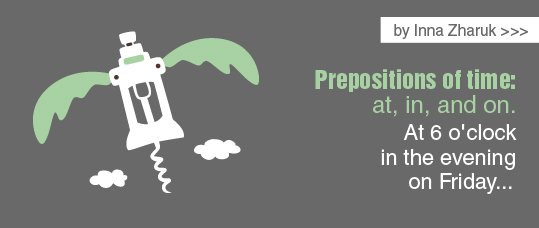Prepositions of Time
There are a lot of prepositions in the English language, but there aren't many which we can use with time phrases. So let's look at them.
There are three prepositions of time we use quite often: at, in, and on.
The preposition at
We use at with special days: at Christmas and at Easter.
At is used with time: at 9 o'clock, at 7.30 am, at 5.15 pm.
Also we use at with parts of the day: at night, at midnight, at noon.
And British people say at the weekend, while Americans say on the weekend.
There are some phrases which you have to learn by heart: at the moment, at present, at the same time, at the end of the week.
The preposition in
We use in with parts of the day: in the morning, in the afternoon, in the evening.
But remember we say at night, at midnight, and at noon.
With months we use in: in January, in February, in March, in April, in May, in June, in July, in August, in September, in October, in November, and in December.
Also we use in with seasons: in winter, in spring, in summer, and in autumn. Americans say instead of autumn fall.
In is used with years, decades and centuries: in 1988 (year), in the 80s (decade), and in the twentieth century.
In is used with duration: in three weeks, in a minute, in two hours.
The preposition on
We use on with days of the week: on Monday, on Tuesday, on Wednesday, on Thursday, on Friday, on Saturday, and on Sunday.
If we want to say, for example, in the evening on Monday, we can say on Monday evening, in the afternoon on Friday will be on Friday afternoon. Pay attention we say on Monday evening, the preposition is on, not in.
We use on with dates: on the 27th of December, on June the 4th, on the 1st of September, etc.
Also we use on with special days if the name of that special day contains the words day or eve: on Christmas Day, on New Year Eve, on my birthday.
With some time phrases we don't use any prepositions at all.
Here are some examples: Last night, last week, last month, last year.
I met my best friend last night.
Tomorrow, today, tonight, yesterday.
He is going to the party tonight.
Tomorrow evening, yesterday morning, etc.
Sue was late yesterday morning.
This week, this month, this year, this morning, this summer, etc.
Jack is reading a very interesting book this week.
Every day, every week, every year, every Thursday, every spring, etc.
We go on holidays every year.
Next week, next month, next year, next winter, etc.
I hope we will go skiing next winter.
To learn these prepositions and phrases isn't so difficult as it seems. Simply repeat the phrases every day and in two weeks you will definitely remember all of them.
















